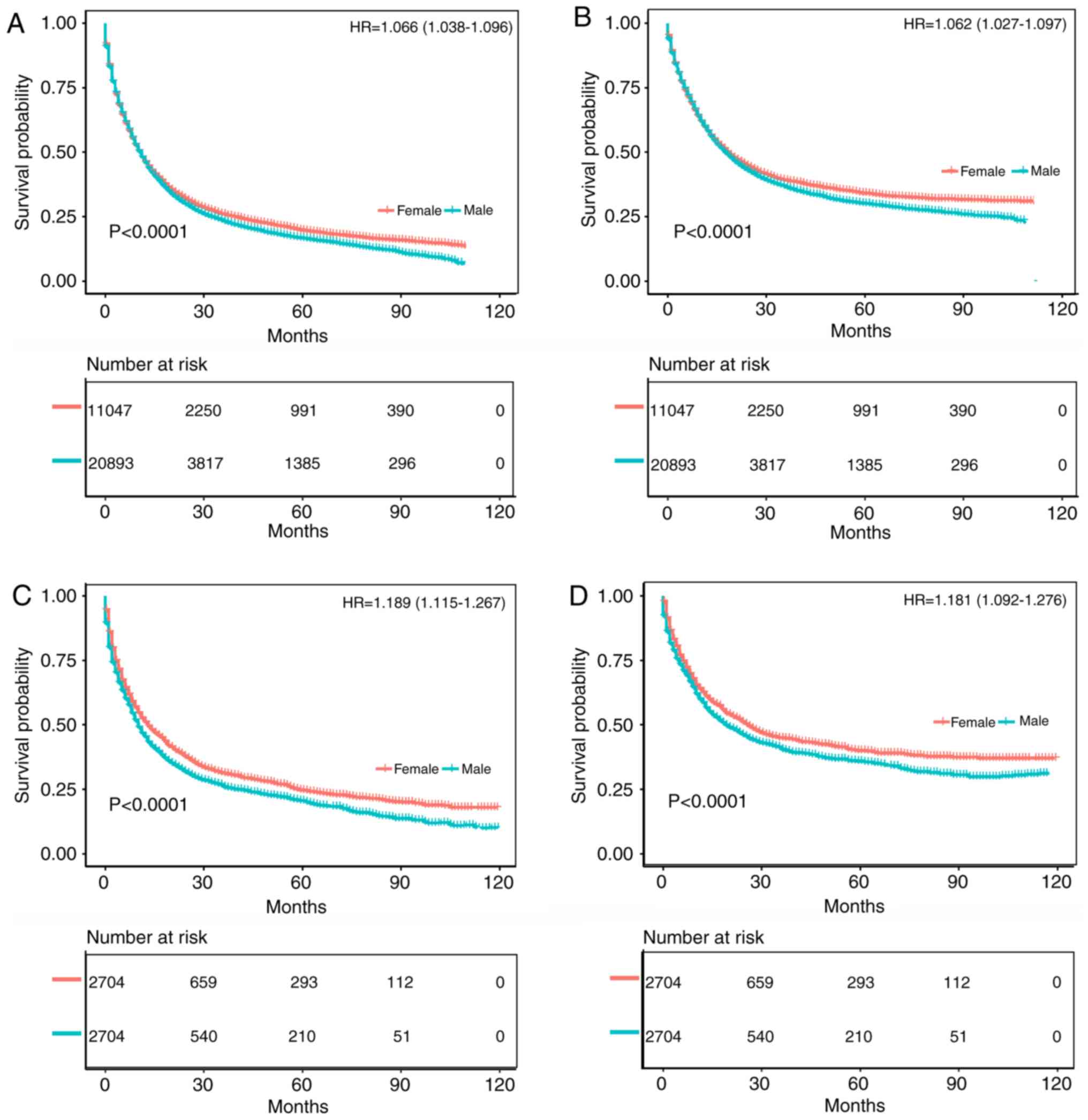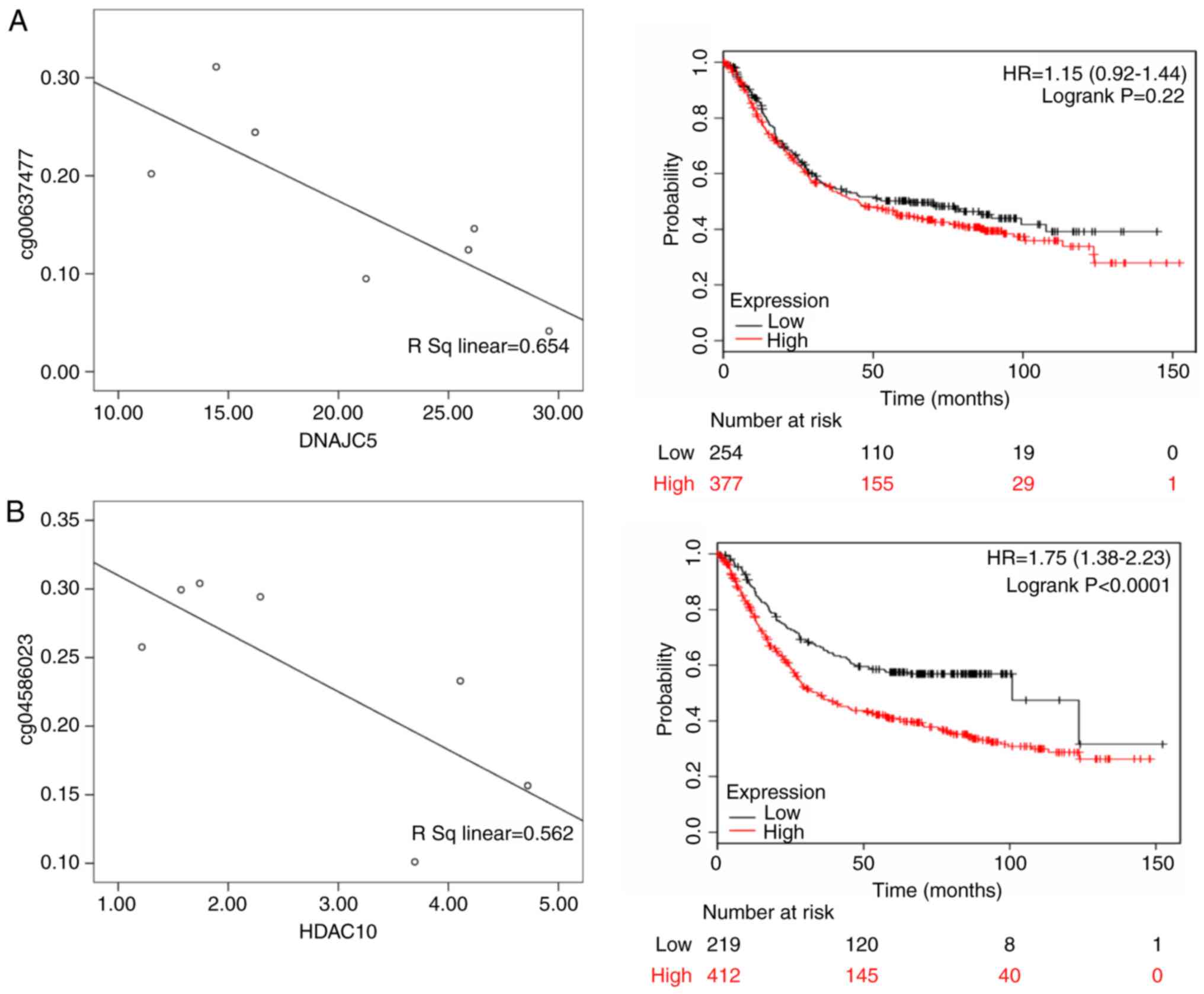|
1
|
Allemani C, Matsuda T, Di Carlo V,
Harewood R, Matz M, Nikšić M, Bonaventure A, Valkov M, Johnson CJ,
Estève J, et al: Global surveillance of trends in cancer survival
2000-14 (CONCORD -3): Analysis of individual records for 37 513 025
patients diagnosed with one of 18 cancers from 322 population based
registries in 71 countries. Lancet. 391:1023–1075. 2018. View Article : Google Scholar : PubMed/NCBI
|
|
2
|
Torre LA, Bray F, Siegel RL, Ferlay J,
Lortet-Tieulent J and Jemal A: Global cancer statistics, 2012. CA
Cancer J Clin. 65:87–108. 2015. View Article : Google Scholar : PubMed/NCBI
|
|
3
|
Dong E, Duan L and Wu BU: Racial and
Ethnic minorities at increased risk for gastric cancer in a
regional US population study. Clin Gastroenterol Hepatol.
15:511–517. 2017. View Article : Google Scholar
|
|
4
|
Ferlay J, Soerjomataram I, Dikshit R, Eser
S, Mathers C, Rebelo M, Parkin DM, Forman D and Bray F: Cancer
incidence and mortality worldwide: Sources methods and major
patterns in GLOBOCAN 2012. Int J Cancer. 136:E359–E386. 2015.
View Article : Google Scholar
|
|
5
|
Karimi P, Islami F, Anandasabapathy S,
Freedman ND and Kamangar F: Gastric cancer: Descriptive
epidemiology, risk factors, screening, and prevention. Cancer
Epidemiol Biomarkers Prev. 23:700–713. 2014. View Article : Google Scholar : PubMed/NCBI
|
|
6
|
Hwang KT, Kim J, Jung J, Chang JH, Chai
YJ, Oh SW, Oh S, Kim YA, Park SB and Hwang KR: Impact of breast
cancer subtypes on prognosis of women with operable invasive breast
cancer: A population-based study using SEER database. Clin Cancer
Res. 25:1970–1979. 2019.
|
|
7
|
Greene FL, Compton CC, Fritz AG, Shah JP
and Winchester DP: AJCC Cancer Staging Atlas. Springer; New York,
NY: 2006, View Article : Google Scholar
|
|
8
|
Li B and Dewey CN: RSEM: Accurate
transcript quantification from RNA-Seq data with or without a
reference genome. BMC Bioinformatics. 12:3232011. View Article : Google Scholar : PubMed/NCBI
|
|
9
|
Aryee MJ, Jaffe AE, Corrada-Bravo H,
Ladd-Acosta C, Feinberg AP, Hansen KD and Irizarry RA: Minfi: A
flexible and comprehensive bioconductor package for the analysis of
infinium DNA methylation microarrays. Bioinformatics. 30:1363–1369.
2014. View Article : Google Scholar : PubMed/NCBI
|
|
10
|
Sandoval J, Mendez-Gonzalez J, Nadal E,
Chen G, Carmona FJ, Sayols S, Moran S, Heyn H, Vizoso M, Gomez A,
et al: A prog nostic DNA methylation signature for stage I
non-small-cell lung cancer. J Clin Oncol. 31:4140–4147. 2013.
View Article : Google Scholar : PubMed/NCBI
|
|
11
|
Teschendorff AE, Marabita F, Lechner M,
Bartlett T, Tegner J, Gomez-Cabrero D and Beck S: A beta-mixture
quantile normalization method for correcting probe design bias in
Illumina Infinium 450 k DNA methylation data. Bioinformatics.
29:189–196. 2013. View Article : Google Scholar :
|
|
12
|
Langevin SM, Butler RA, Eliot M, Pawlita
M, Maccani JZ, McClean MD and Kelsey KT: Novel DNA methylation
targets in oral rinse samples predict survival of patients with
oral squamous cell carcinoma. Oral Oncol. 50:1072–1080. 2014.
View Article : Google Scholar : PubMed/NCBI
|
|
13
|
Böhnke JR: Explanation in causal
inference: Methods for mediation and interaction. Q J Exp Psychol
(Hove). 69:1243–1244. 2016. View Article : Google Scholar
|
|
14
|
Gene Ontology Consortium: The gene
ontology (GO) project in 2006. Nucleic Acids Res. 34:D322–D326.
2006. View Article : Google Scholar :
|
|
15
|
Ashburner M, Ball CA, Blake JA, Botstein
D, Butler H, Cherry JM, Davis AP, Dolinski K, Dwight SS, Eppig JT,
et al: Gene ontology: Tool for the unification of biology. The gene
ontology consortium. Nat Genet. 25:25–29. 2000. View Article : Google Scholar : PubMed/NCBI
|
|
16
|
Györffy B, Lanczky A, Eklund AC, Denkert
C, Budczies J, Li Q and Szallasi Z: An online survival analysis
tool to rapidly assess the effect of 22,277 genes on breast cancer
prognosis using microarray data of 1,809 patients. Breast Cancer
Res Treat. 123:725–731. 2010. View Article : Google Scholar
|
|
17
|
Austin PC: Optimal caliper widths for
propensity-score matching when estimating differences in means and
differences in proportions in observational studies. Pharm Stat.
10:150–161. 2011. View
Article : Google Scholar :
|
|
18
|
Herman JG and Baylin SB: Gene silencing in
cancer in association with promoter hypermethylation. N Engl J Med.
349:2042–2054. 2003. View Article : Google Scholar : PubMed/NCBI
|
|
19
|
Aron M, Nguyen MM, Stein RJ and Gill IS:
Impact of gender in renal cell carcinoma: An analysis of the SEER
database. Eur Urol. 54:133–140. 2008. View Article : Google Scholar
|
|
20
|
Kim HW, Kim JH, Lim BJ, Kim H, Kim H, Park
JJ, Youn YH, Park H, Noh SH, Kim JW and Choi SH: Sex disparity in
gastric cancer: Female sex is a poor prognostic factor for advanced
gastric cancer. Ann Surg Oncol. 23:4344–4351. 2016. View Article : Google Scholar : PubMed/NCBI
|
|
21
|
Li H, Wei Z, Wang C, Chen W, He Y and
Zhang C: Gender differences in gastric cancer survival: 99,922
cases based on the SEER database. J Gastrointest Surg. Jul
25–2019.Epub ahead of print. View Article : Google Scholar
|
|
22
|
Ashktorab H, Kupfer SS, Brim H and
Carethers JM: Racial disparity in gastrointestinal cancer risk.
Gastroenterology. 153:910–923. 2017. View Article : Google Scholar : PubMed/NCBI
|
|
23
|
Loh M, Koh KX, Yeo BH, Song CM, Chia KS,
Zhu F, Yeoh KG, Hill J, Iacopetta B and Soong R: Meta-analysis of
genetic polymorphisms and gastric cancer risk: Variability in
associations according to race. Eur J Cancer. 45:2562–2568. 2009.
View Article : Google Scholar : PubMed/NCBI
|
|
24
|
Lou W, Ding B and Fan W: High expression
of pseudogene PTTG3P indicates a poor prognosis in human breast
cancer. Mol Ther Oncolytics. 14:15–26. 2019. View Article : Google Scholar : PubMed/NCBI
|
|
25
|
Jung Y, Lee S, Choi HS, Kim SN, Lee E,
Shin Y, Seo J, Kim B, Jung Y, Kim WK, et al: Clinical validation of
colorectal cancer biomarkers identified from bioinformatics
analysis of public expression data. Clin Cancer Res. 17:700–709.
2011. View Article : Google Scholar : PubMed/NCBI
|
|
26
|
Yu VW, Ambartsoumian G, Verlinden L, Moir
JM, Prud'homme J, Gauthier C, Roughley PJ and St-Arnaud R: FIAT
represses ATF4-mediated transcription to regulate bone mass in
transgenic mice. J Cell Biol. 169:591–601. 2005. View Article : Google Scholar : PubMed/NCBI
|
|
27
|
Benitez BA and Sands MS: Primary
fibroblasts from CSPα mutation carriers recapitulate hallmarks of
the adult onset neuronal ceroid lipofuscinosis. Sci Rep.
7:63322017. View Article : Google Scholar
|
|
28
|
Tao X, Yan Y, Lu L and Chen B: HDAC10
expression is associated with DNA mismatch repair gene and is a
predictor of good prognosis in colon carcinoma. Oncol Lett.
14:4923–4929. 2017. View Article : Google Scholar : PubMed/NCBI
|
|
29
|
Qu H, Sun H and Wang X: Neogenin-1
promotes cell proliferation, motility, and adhesion by
up-regulation of zinc finger E-box binding homeobox 1 via
activating the Rac1/PI3K/AKT pathway in gastric cancer cells. Cell
Physiol Biochem. 48:1457–1467. 2018. View Article : Google Scholar : PubMed/NCBI
|
|
30
|
Wong HY, Wang GM, Croessmann S, Zabransky
DJ, Chu D, Garay JP, Cidado J, Cochran RL, Beaver JA, Aggarwal A,
et al: TMSB4Y is a candidate tumor suppressor on the Y chromosome
and is deleted in male breast cancer. Oncotarget. 6:44927–44940.
2015. View Article : Google Scholar : PubMed/NCBI
|
|
31
|
Tricoli JV and Bracken RB: ZFY gene
expression and retention in human prostate adenocarcinoma. Genes
Chromosomes Cancer. 6:65–72. 1993. View Article : Google Scholar : PubMed/NCBI
|
|
32
|
Li Y, Tan BB, Zhao Q, Fan LQ, Wang D and
Liu Y: ZNF139 promotes tumor metastasis by increasing migration and
invasion in human gastric cancer cells. Neoplasma. 61:291–298.
2014. View Article : Google Scholar : PubMed/NCBI
|























